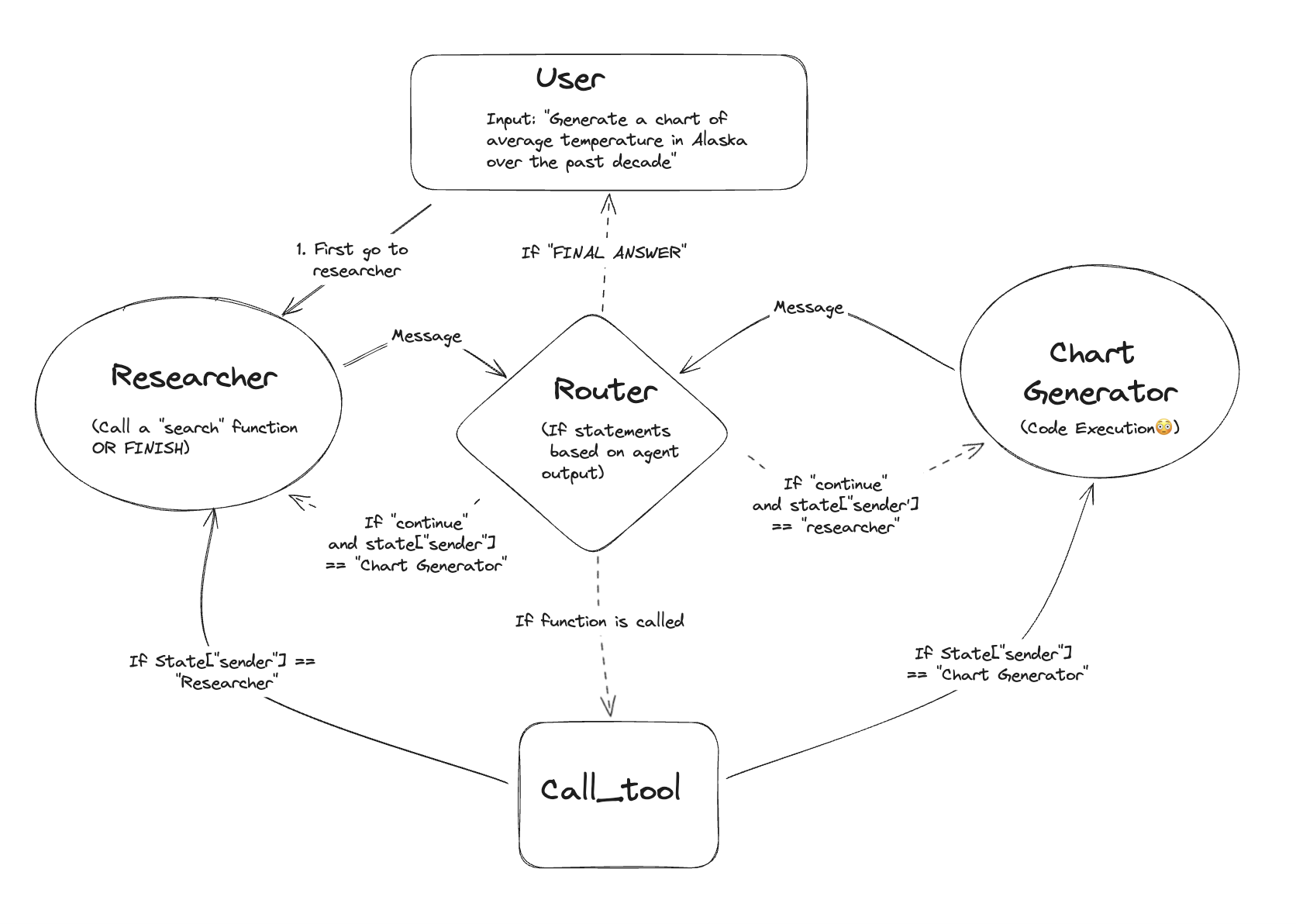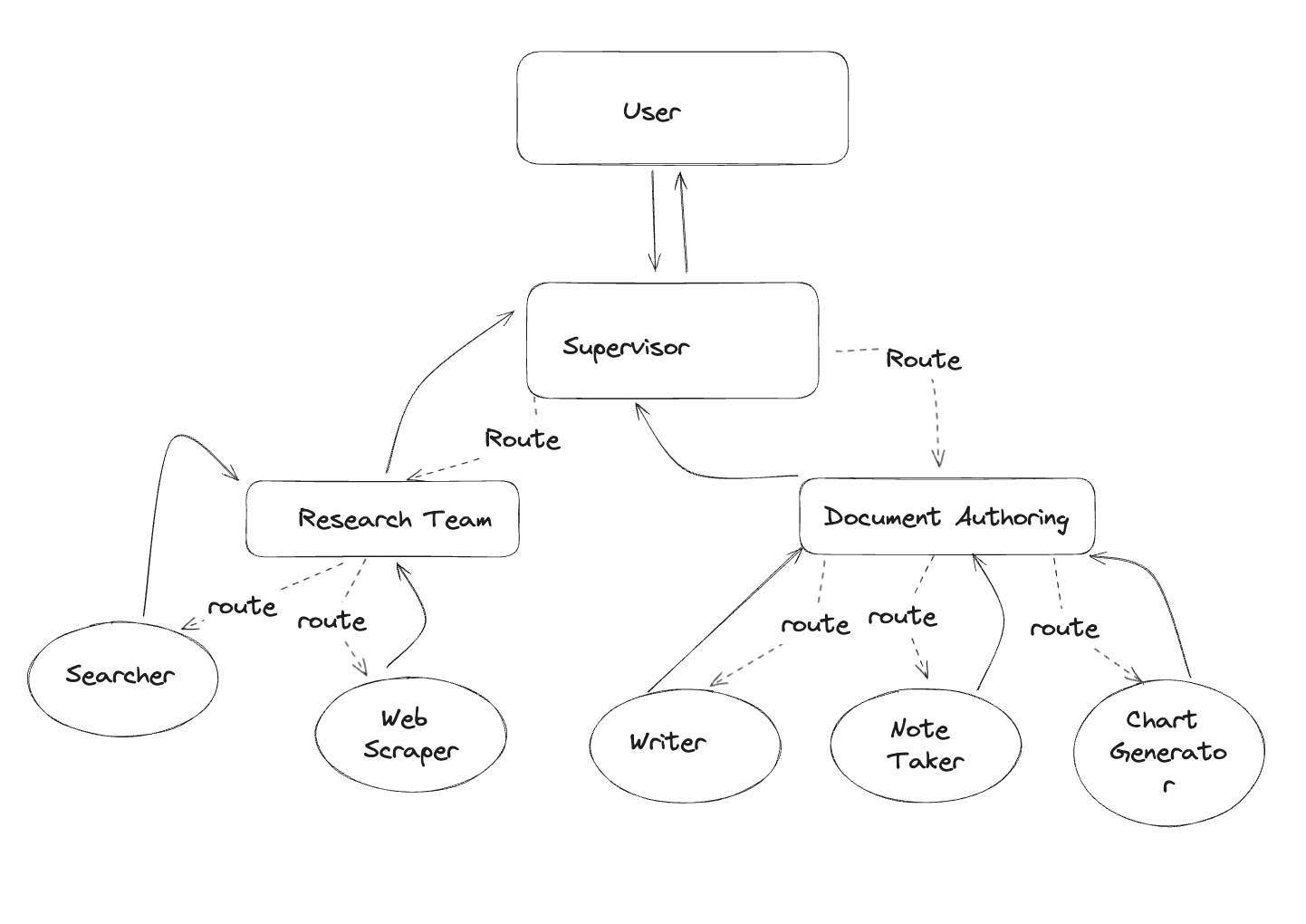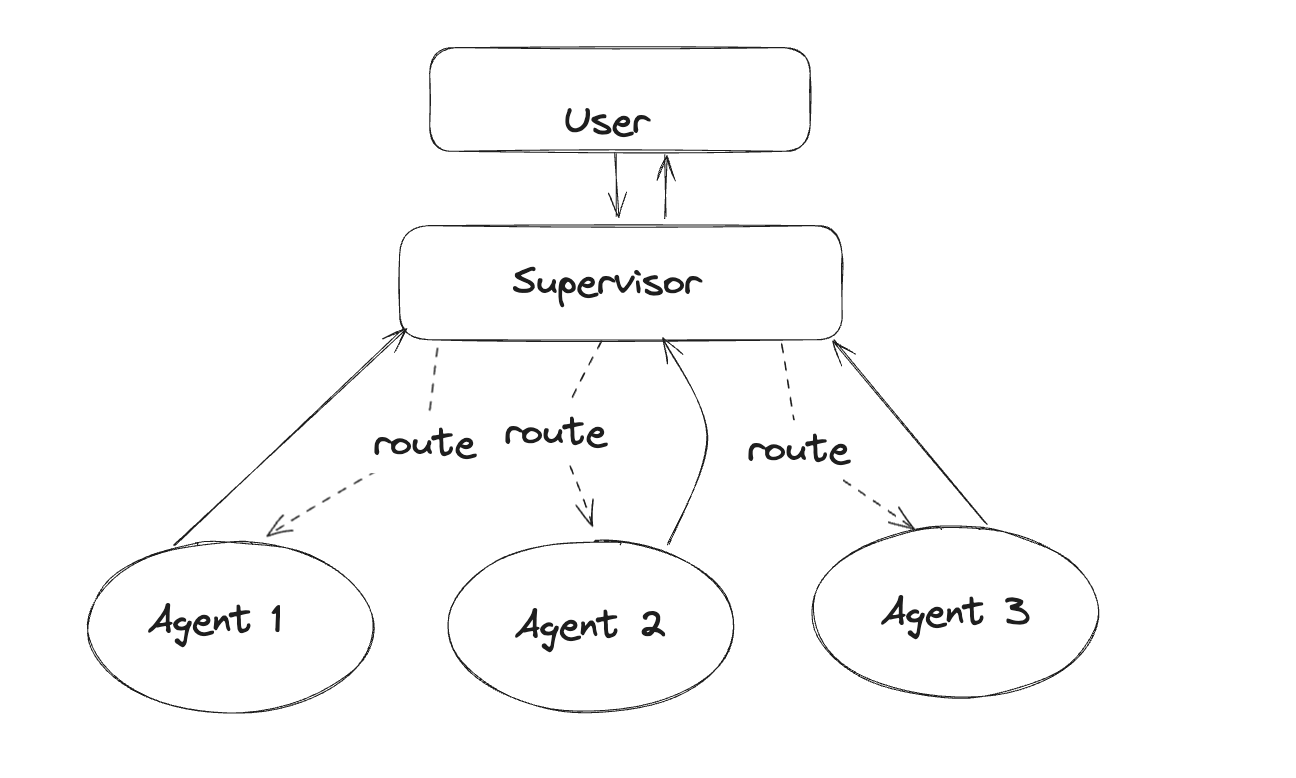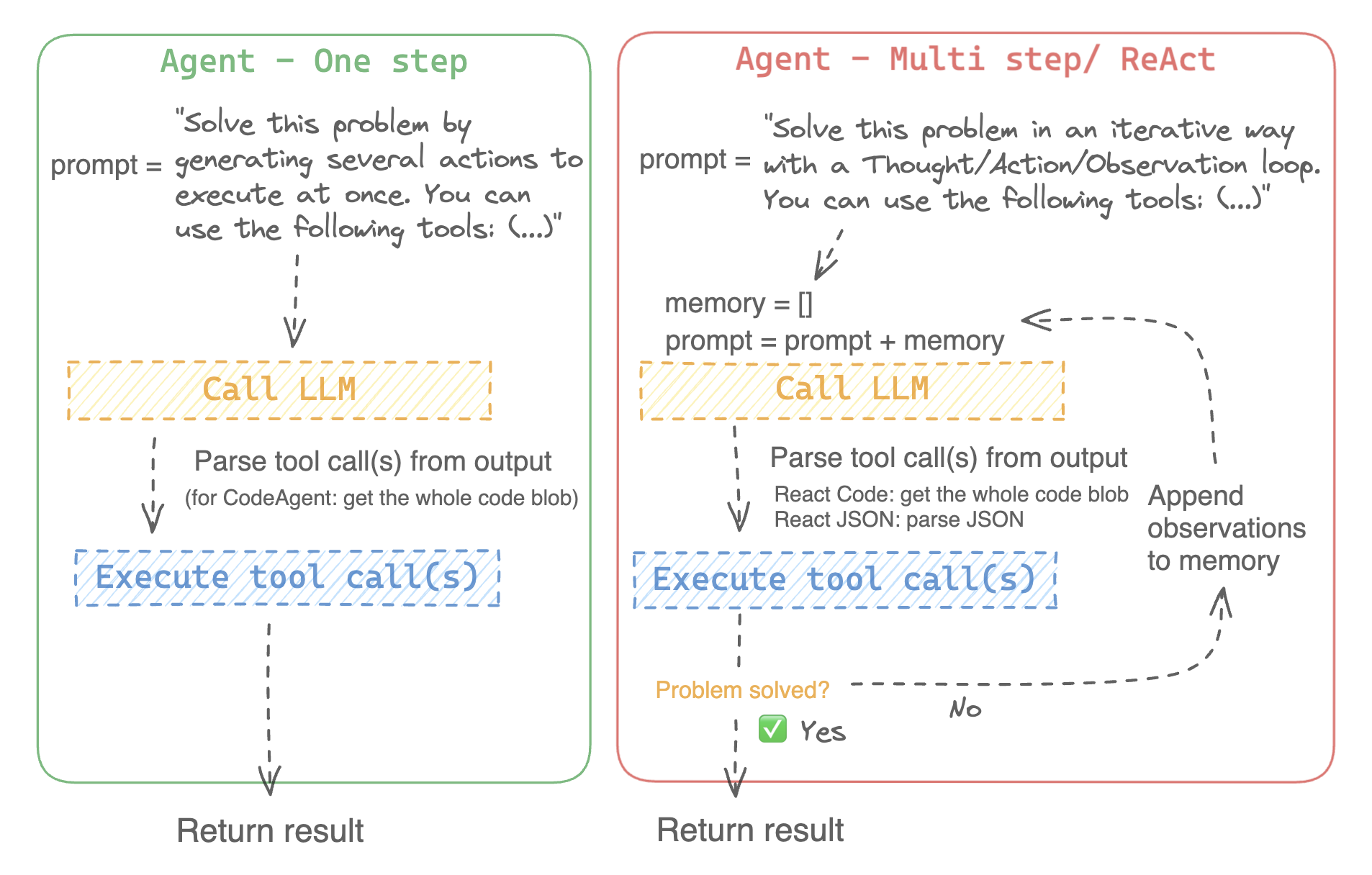Agents
Introduction to AI Agents, Langchain, SWE.
Agents
LLM Agent Paper List
Paper: The Rise and Potential of Large Language Model Based Agents: A Survey

Survey of LLM-based AI Agents
Paper: An In-depth Survey of Large Language Model-based Artificial Intelligence Agents


Blog: 4 Autonomous AI Agents you need to know
Camel
Communicative Agents for “Mind” Exploration of Large Language Model Society
Code: https://github.com/camel-ai/camel

AutoGPT
Paper: Auto-GPT for Online Decision Making: Benchmarks and Additional Opinions
Code: https://github.com/Significant-Gravitas/Auto-GPT
Blog: AutoGPT architecture & breakdown
Tutorials: AutoGPT Forge
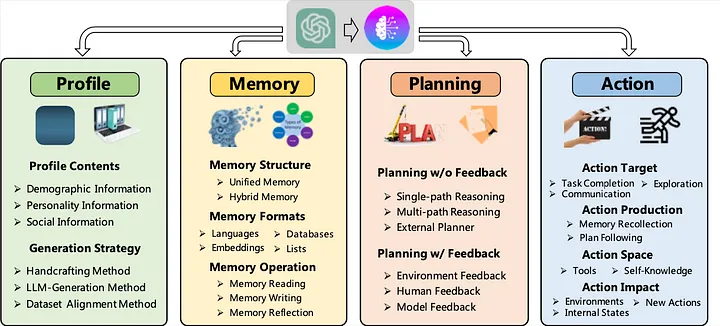
AgentGPT
Code: https://github.com/reworkd/AgentGPT
BabyAGI
Blog: Task-driven Autonomous Agent Utilizing GPT-4, Pinecone, and LangChain for Diverse Applications

Colab:
Godmode
Voyager
Paper: Voyager: An Open-Ended Embodied Agent with Large Language Models
Code: https://github.com/MineDojo/Voyager

Talk2Drive
Paper: Large Language Models for Autonomous Driving: Real-World Experiments
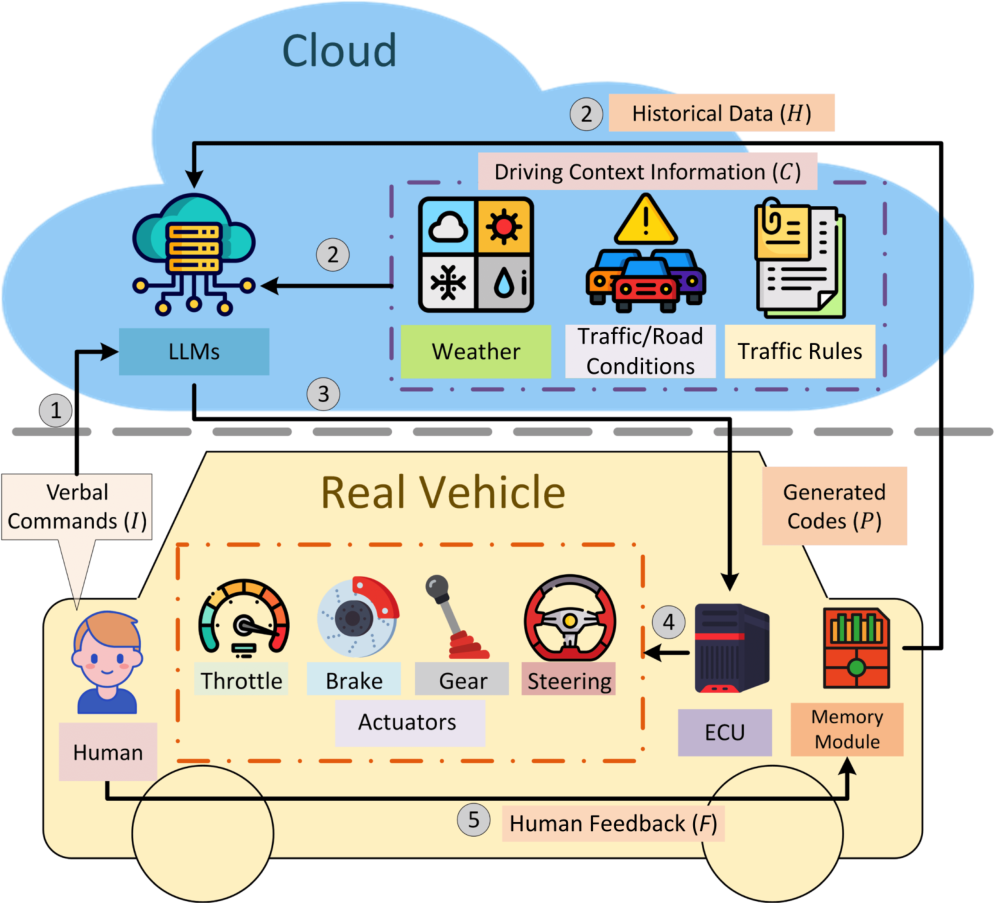
MemGPT
Paper: MemGPT: Towards LLMs as Operating Systems
Code: https://github.com/cpacker/MemGPT

RL-GPT
Paper: RL-GPT: Integrating Reinforcement Learning and Code-as-policy
MC-Planner
Paper: https://arxiv.org/abs/2302.01560
Code: https://github.com/CraftJarvis/MC-Planner

Multi-Agent
Generative Agents
Paper: Generative Agents: Interactive Simulacra of Human Behavior«br>
Code: https://github.com/joonspk-research/generative_agents
Demo

Blog: Paper Review: Generative Agents: Interactive Simulacra of Human Behavior
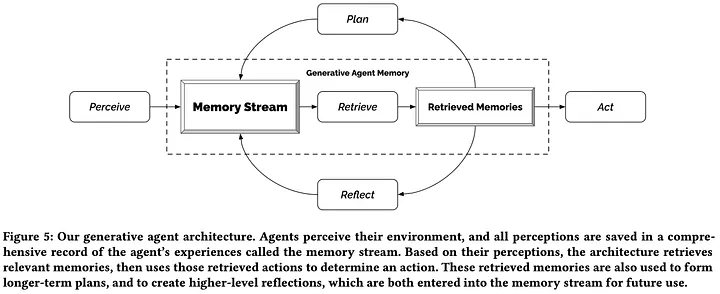
Multi-Agent Collaboration
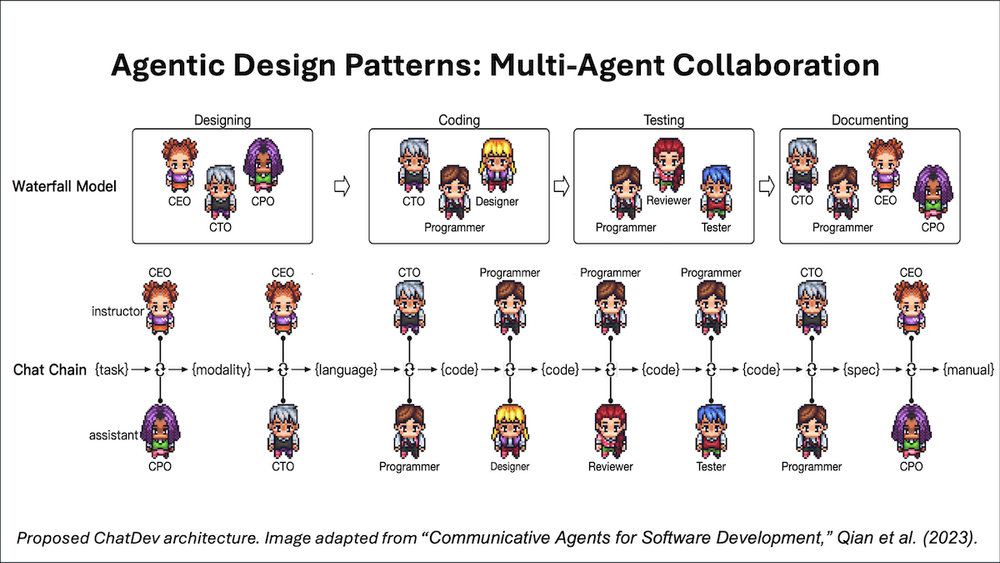
- “Communicative Agents for Software Development,” Qian et al. (2023) (the ChatDev paper)
- “AutoGen: Enabling Next-Gen LLM Applications via Multi-Agent Conversation,” Wu et al. (2023)
- “MetaGPT: Meta Programming for a Multi-Agent Collaborative Framework,” Hong et al. (2023)
Multi-Agent examples
LangGraph + Llama3 + Groq
Colab: https://drp.li/X3hpZ
Frameworks
LangChain
LangGraph
SWE
OpenDevin
Paper: SWE-AGENT: AGENT-COMPUTER INTERFACES ENABLE AUTOMATED SOFTWARE ENGINEERING
Code: https://github.com/OpenDevin/OpenDevin
Docs: OpenDevin Intro

DroidAgent
Paper: Autonomous Large Language Model Agents Enabling Intent-Driven Mobile GUI Testing
Code: DroidAgent: Intent-Driven Android GUI Testing with LLM Agents

WebVoyager
Paper: WebVoyager: Building an End-to-End Web Agent with Large Multimodal Models
Code: https://github.com/MinorJerry/WebVoyager

AutoCodeRover
Paper: AutoCodeRover: Autonomous Program Improvement


ReAct
Chain of thought and ReAct

- Thought: The reasoning step, or thought, serves as a guide to the Foundation model, demonstrating how to approach a problem. It involves formulating a sequence of questions that lead the model to the desired solution.
- Action: Once the thought is established, the next step is to define an action for the Foundation model to take. This action typically involves invoking an API from a predefined set, allowing the model to interact with external resources.
- Observation: Following the action, the model observes and analyzes the results. The observations become crucial input for further reasoning and decision-making.
List chain-of-thought steps:
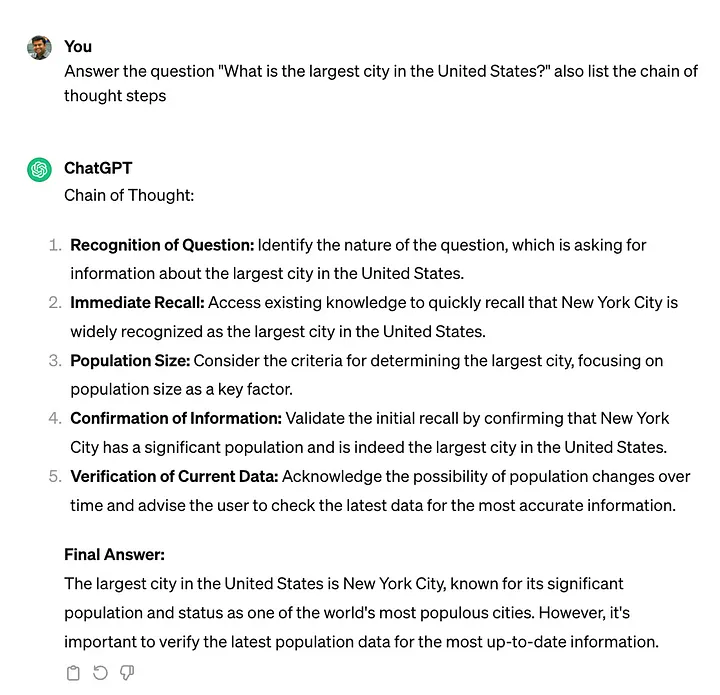
List ReAct steps:
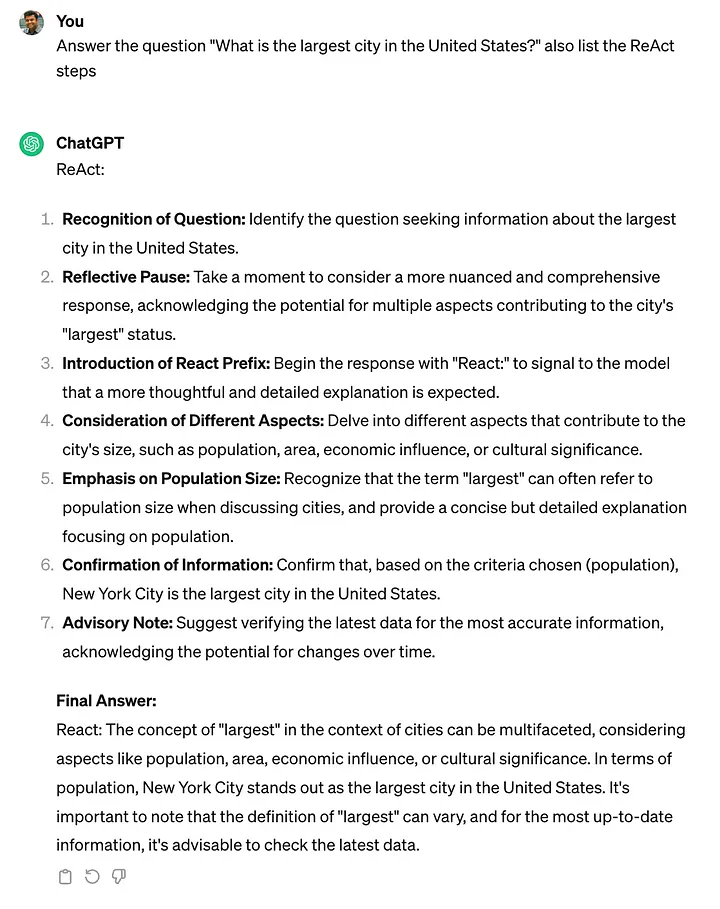
Langchain ReAct
Llamaindex ReAct
ReAct Agent - A Simple Intro with Calculator Tools
ReAct Agent with Query Engine (RAG) Tools
Controlling Agent Reasoning Loop with Return Direct Tools
Fine-tuning a gpt-3.5 ReAct Agent on Better Chain of Thought
Custom Cohere Reranker
Octpus
Paper: Octopus: Embodied Vision-Language Programmer from Environmental Feedback
Code: https://github.com/dongyh20/Octopus
Octpus v2
Paper: Octopus v2: On-device language model for super agent
model: NexaAIDev/Octopus-v2
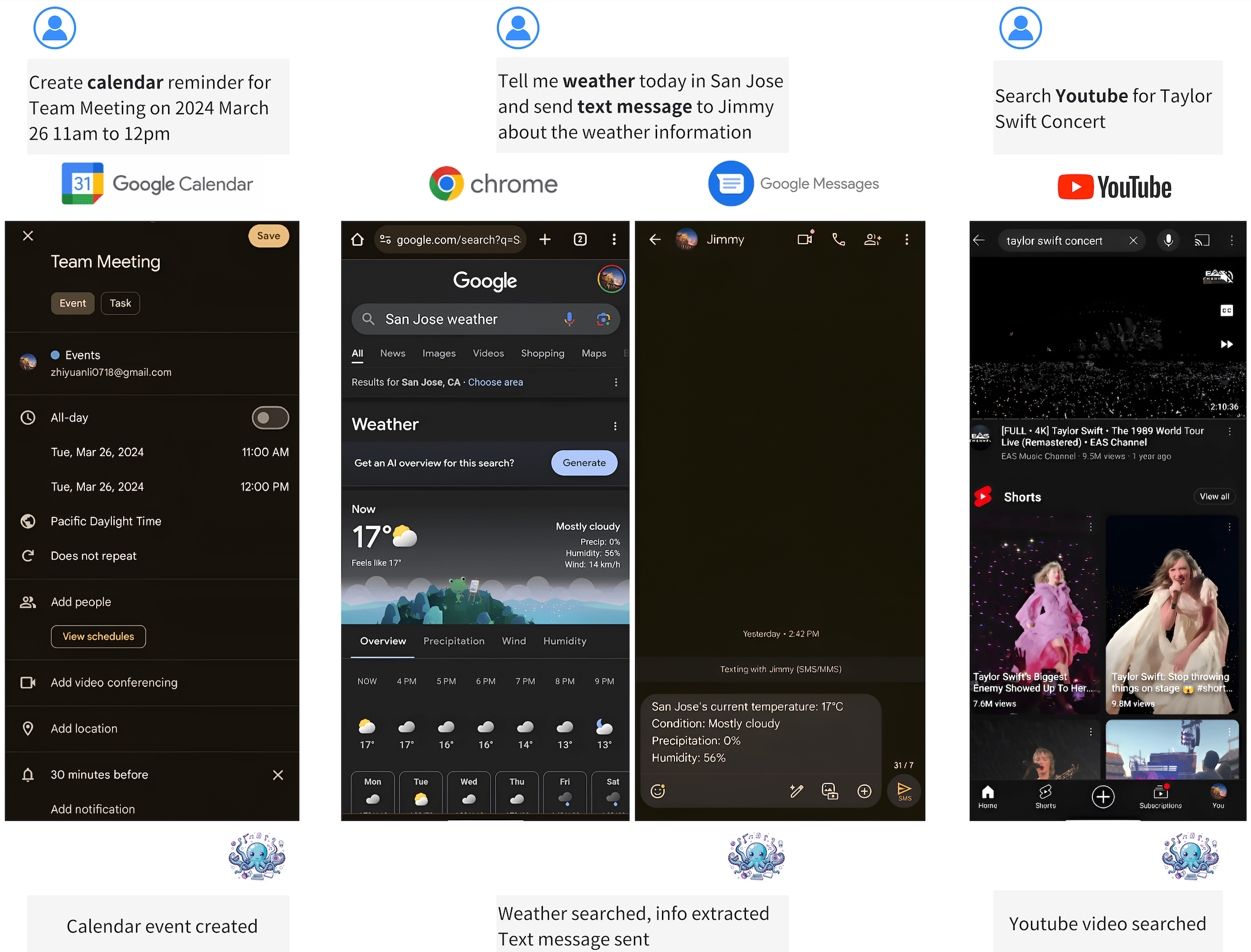 kaggle: https://www.kaggle.com/code/rkuo2000/octopus-v2
kaggle: https://www.kaggle.com/code/rkuo2000/octopus-v2
Octpus v3
Paper: Octopus v3: Technical Report for On-device Sub-billion Multimodal AI Agent
Octpus v4
Paper: Octopus v4: Graph of language models
model: NexaAIDev/octo-net
Code: https://github.com/NexaAI/octopus-v4
ADAS
Paper: Automated Design of Agentic Systems
Code: https://github.com/ShengranHu/ADAS

Gödel Agent
Paper: Gödel Agent: A Self-Referential Agent Framework for Recursive Self-Improvement
Code: https://github.com/semanser/codel
 語言模型隨著代理系統(agentic system)的發展,在推理、工作規畫等領域有很大幅度的進步,這些代理系統(agentic system)主要可以分為兩大類,一是固定整個工作流與工作模組的Hand-Designed Agent;另外一種則是允許較彈性的工作流,並讓Agent可以適度選用工具的Meta-Learning Optimized Agents。但這兩者皆是基於人類先驗經驗而設計的系統,它將受限於人類的經驗,使得整個系統失去最佳化的可能性。
語言模型隨著代理系統(agentic system)的發展,在推理、工作規畫等領域有很大幅度的進步,這些代理系統(agentic system)主要可以分為兩大類,一是固定整個工作流與工作模組的Hand-Designed Agent;另外一種則是允許較彈性的工作流,並讓Agent可以適度選用工具的Meta-Learning Optimized Agents。但這兩者皆是基於人類先驗經驗而設計的系統,它將受限於人類的經驗,使得整個系統失去最佳化的可能性。
本篇論文的研究團隊,嘗試利用哥德爾機(Gödel machine)的概念,讓Agent可以自行決定工作流程,自行選用工具模組,並依照環境反饋,自我改良整個工作系統,研究團隊將其稱為Gödel Agent。
在這篇概念性的論文中,研究團隊指出如果要能實現自我優化,Gödel Agent至少需具備四種能力:
- 自我覺察(Self-Awareness)
能夠讀取工作流當下,環境與Agent的各式變數、函式、類等參數值,取得整體的運作狀態(operating state)。
- 自我改善(Self-Improvement)
- 能夠利用推理與規劃的能力,針對當下狀況,認知到應該調整那些工作區塊,並進而調整程式碼去修改工作邏輯。
- 與環境互動(Environmental Interaction)
針對當前修改的結果,可以由環境的狀態變化取得反饋,得知目前的策略是否成功,並評估是否需要再度調整。
- 持續改進(Recursive Improvement)
利用前三項能力,不停迭代,在經過幾次迭代後,這將產生類似Gödel machine的效果,以達到整個系統的最佳化。
研究團隊給予Gödel Agent幾種不同的工作類型,測試它的表現,並與過往幾種方法,諸如CoT、Self-Refine、Role Assignment、Meta Agent Search進行比較,就結果上來說Gödel Agent完勝,不過由於測試的工作類型較侷限,目前尚未知道Gödel Agent在不同的領域是否都如此出色。
研究團隊也給出未來的研究方向,例如語言模型能否產生集體智慧(collective Intelligence),或者Gödel Agent是否確實達到系統理論上的最佳化(theoretical optimality)等,都是有趣的研究主題。
OpenAI Swarm

llama3-groq
import openai
from google.colab import userdata
model = "llama3-groq-70b-8192-tool-use-preview"
llm_client = openai.OpenAI(
base_url="https://api.groq.com/openai/v1",
api_key=userdata.get('GROQ_API_KEY'),
)
bare_minimum
# https://github.com/openai/swarm/blob/main/examples/basic/bare_minimum.py
from swarm import Swarm, Agent
swarm_client = Swarm(client=llm_client)
agent = Agent(
name="Agent",
instructions="You are a helpful agent.",
model=model,
tool_choice="auto"
)
messages = [{"role": "user", "content": "Hi!"}]
response = swarm_client.run(agent=agent, messages=messages)
print(response.messages[-1]["content"])
Swarm_Llama3-Groq.ipynb
MLE-bench
Paper: MLE-bench: Evaluating Machine Learning Agents on Machine Learning Engineering
Code: https://github.com/openai/mle-bench


AI Agent分析中華隊 12 強預賽成績
AI Agent:實戰篇 — 透過 Google Gemini Model 和 Langchain 來分析中華隊 12 強預賽成績
smolagents
examples:
Agentic Workflow
Reasoning Language Models
Paper: Reasoning Language Models: A Blueprint
PRefLexOR
Paper: [PRefLexOR: Preference-based Recursive Language Modeling for Exploratory Optimization of Reasoning and Agentic Thinking]ㄞhttps://arxiv.org/pdf/2501.08120)
Model: https://huggingface.co/lamm-mit/Graph-Preflexor_01062025
Github: https://github.com/lamm-mit/PRefLexOR
This site was last updated September 17, 2025.

